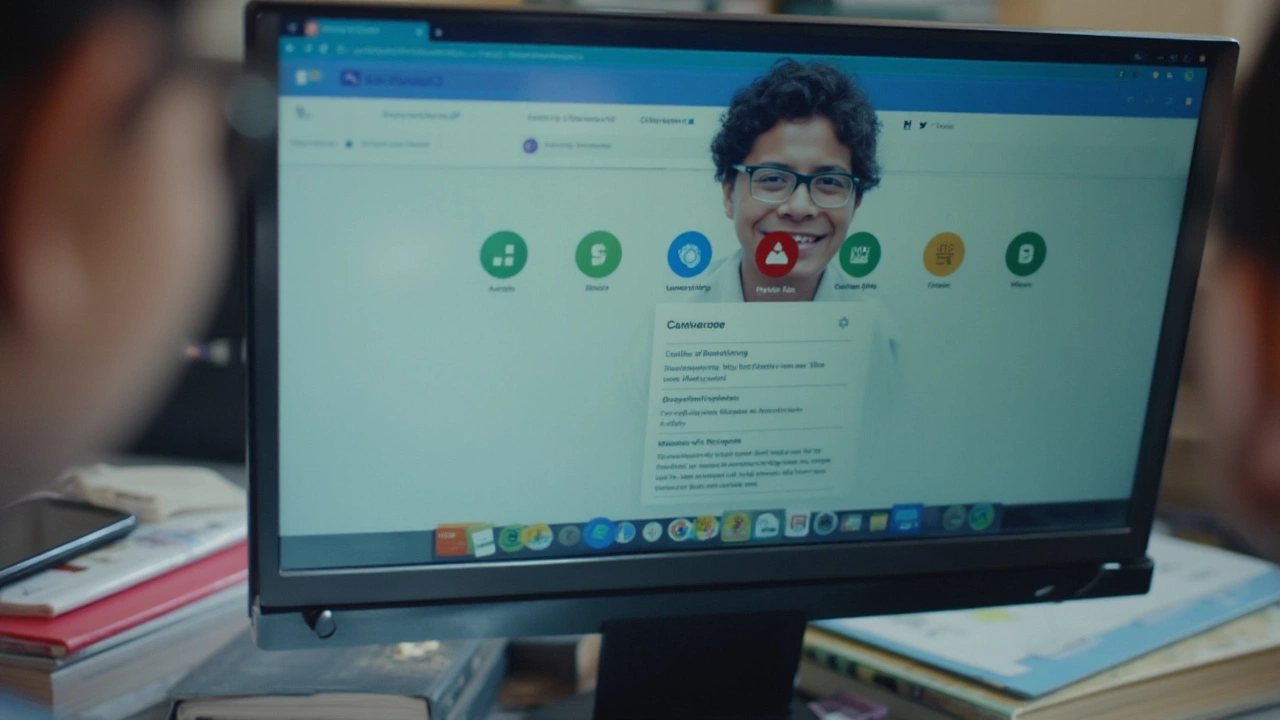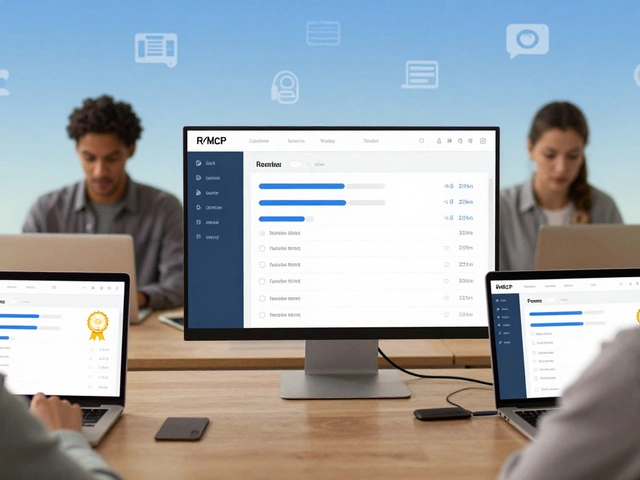Dec
25

- by Dhruv Ainsley
- 0 Comments
Google Certificate Courses have opened the door for countless individuals eager to bolster their resumes with skills that are both trendy and relevant. These courses cover a spectrum of fields, letting learners dive into areas such as data analytics, project management, and UX design. But, how much do they really cost, and what is the value they offer?
Many people have turned to these courses, attracted by their relatively low price and the promise of flexible learning. Generally, a Google certificate will set you back about $39 each month, with the total expense depending on how quickly you complete the course. Let’s explore what this means for those considering enrolling in one.
- Understanding Google Certificate Courses
- Cost Breakdown and Structure
- Time Investment and Learning Pace
- Financial Aid and Discounts
- Career Impact and Opportunities
- Is a Google Certificate Worth It?
Understanding Google Certificate Courses
In today's fast-paced digital world, staying relevant is crucial, and one way to keep up with the demands is through continuous learning. The advent of Google Certificate Courses has revolutionized this realm by offering accessible and practical education avenues. These courses are a part of Google’s professional certification initiative, designed to fill the gap between traditional academic education and practical job skills necessary for today’s employment market. This initiative is primarily hosted on platforms like Coursera, making it globally accessible to anyone with an internet connection.
Initially targeting high-demand tech roles, Google certification programs cover fields such as IT support, data analytics, project management, and UX design, among others. Each course is meticulously crafted to include a combination of theory, practical exercises, and hands-on projects which simulate real-world challenges that one might face in the industry. This blend not only aids in knowledge acquisition but also ensures applicants can readily apply what they learn in a practical setting. Google has collaborated with and garnered support from employers across industries to ensure the relevancy and applicability of these courses.
"Our courses are designed to prepare individuals for entry-level jobs in high-growth fields in under six months with no prior experience required," states Lisa Gevelber, a VP at Grow with Google.This philosophy is echoed profoundly in the course structure, allowing students to learn at their own pace, accommodating different learning styles and schedules. As of October 2023, over 300,000 students have enrolled in Google's IT support program alone, a testament to its strong reputation and demand.
While some might ponder the necessity of these courses when traditional degrees exist, Google Certificate Courses offer a unique advantage. They are far more affordable, flexible, and directly aligned with immediate job requirements, which is not always the case with traditional degrees. Considering that these certificates are recognized by industry giants like Walmart, Bank of America, and Best Buy ensures that learners are valued in the job market. A certification from Google can serve as a significant asset, signaling to employers a readiness to contribute to professional environments.
Moreover, Google continuously updates the coursework to align with current industry demands. This means learners are always up-to-date with the newest techniques and technologies, making them highly competitive candidates for employment. For instance, their data analytics course includes modern tools like SQL, R Programming, and Tableau, which are integral in current data-driven decision-making processes. This continuous update ensures that the skills learned are directly applicable, minimizing the learning curve during job transitions.
Cost Breakdown and Structure
Navigating the financial aspect of Google certificate courses can feel daunting at first, but there's a clear breakdown that reveals the value packed within these programs. Most Google certifications harness a straightforward pricing model, costing learners about $39 per month. This monthly subscription is designed to be affordable, aligning with Google’s mission to democratize education and provide access to high-quality learning resources. Importantly, these courses are hosted on Coursera, a globally recognized platform that ensures a seamless user experience. It's noteworthy how Google has priced these courses to fit into a variety of budgets, making learning accessible to a wide audience.
One of the key aspects of the cost structure is that it supports self-paced learning, so the total cost depends significantly on how fast you move through the material. For many, this means they can control their educational expenses by dedicating more or less time each week to their studies. For instance, ambitious learners dedicating substantial hours might finish an average course in three months, capping their total spend at around $120. However, those who need more time due to other commitments could find the costs slightly higher. Notably, the commitment levels required vary between courses; some short courses may take just a few months, while others can extend up to six months or beyond.
Another intriguing component of Google's pricing approach is the leverage of financial aid options. Google offers financial aid to those who demonstrate need, significantly reducing the barrier to entry. This aid can often cover most, if not all, of the course costs, depending on eligibility. Coursera provides details on how to apply for this aid, encouraging learners from all walks of life to consider upgrading their skills without the burden of financial stress. From a strategic viewpoint, these initiatives ensure a diverse learning community that brings different perspectives to the table—a feature that benefits learners seeking to broaden their understanding not only academically but socially.
Moreover, Google sometimes partners with employers or educational institutions to offer group discounts or specialized training programs. This reflects a broader trend in corporate education, where organizations are investing in micro-credentialing for their employees to enhance skills rapidly and effectively in response to fast-changing technology landscapes. Not only does this result in cost-efficiency for companies, but it also opens more doors for employees to pursue professional development without personal financial outlay. An increase in job-ready skills invariably strengthens their career trajectory and competitiveness in the ever-evolving job market.
In terms of additional costs, learners should bear in mind that some courses may recommend purchasing supplementary materials, such as textbooks or software, beyond the digital resources provided. While these are not compulsory, they can enhance the learning experience and provide a deeper insight into specific topics. However, those who make judicious use of included resources, like interactive exercises and peer discussions, often find that no extra purchases are required to succeed.
"The beauty of the flexible pricing and structure of Google certificate courses is that it brings high-quality and practical education to virtually anyone willing to learn," shares Emily Mathews, an education analyst at Tech Edu Review.
In summary, the cost trajectory of Google certification is designed with careful consideration of diverse learning needs and budgetary constraints, making it a truly adaptable educational investment for aspiring professionals worldwide.

Time Investment and Learning Pace
When diving into a Google certificate course, one of the first considerations is time investment. Each program offers a flexible, self-paced structure designed to fit into diverse schedules, which is a significant advantage. Typically, these courses estimate a commitment of about 10 hours per week. This makes it feasible for both full-time students and those already in the workforce to engage in learning without disrupting their daily routines. The key here is flexibility, allowing learners to speed up or slow down depending on their personal and professional commitments. This elasticity not only helps manage time better but also makes the process less overwhelming and more personalized.
The duration to complete a Google certificate is around three to six months, depending on how much time you dedicate weekly. For instance, if you're consistent with the recommended 10 hours a week, the course can be completed within a four-month window. Some learners, driven by specific career goals or sheer eagerness, manage to finish faster by doubling their weekly hours. On the other hand, those who prefer to absorb information gradually might find extending the learning period beneficial for a deeper understanding. It’s a refreshing approach that breaks away from the restrictive timelines traditional education often imposes.
"The beauty of Google’s approach is its adaptability. You build your career momentum at your own pace," notes Lisa Messina, a renowned educator who supports this flexible learning model.
It's important to understand that the self-paced nature encourages discipline and personal responsibility. Setting a personal schedule, staying consistent, and holding yourself accountable are crucial elements for success. Learners often share that creating a weekly plan helps maintain momentum. This not only aids in timely completion but also integrates learning as a habit rather than a task. Moreover, some users suggest pairing up with study groups or joining online forums related to the course. These platforms foster a supportive community, offering motivation and solving doubts collaboratively. Such peer interactions can be invaluable to the learning journey, making it less isolating and more engaging.
In terms of outcomes, this varies. Real-life applications of course materials can sometimes mean stopping midway to incorporate the skills directly into ongoing projects or job challenges. For instance, a learner aiming to step into project management might immediately apply a newly acquired framework to streamline their current work processes. By allowing real-time application, Google certificates don’t just serve as an academic tool; they seamlessly blend with and enhance real-world skills. It is this practical relevance that distinguishes these courses from conventional online programs.
Financial Aid and Discounts
For those considering a Google certificate course, one of the encouraging aspects is the accessibility of financial aid and discounts, offering relief to learners worried about monetary constraints. Google is keen on democratizing education by ensuring that cost isn't a barrier for enthusiastic learners. Through the course provider Coursera, financial aid is an option for those who qualify, allowing eligible students to access courses without the usual monthly fees. To apply, potential candidates need to complete an application provided by Coursera, which asks them about their financial situation and explains how the course could impact their career or academic goals.
A noteworthy alternative path to learning is the 7-day free trial period provided by Coursera for several online learning courses. This opportunity offers students a taste of the comprehensive content without any initial financial commitment, helping them decide if the course aligns with their expectations and aspirations. It’s a strategic initiative that emboldens individuals to leap into new fields with less hesitation. Alongside financial aid, often there are special offers available through partnerships or seasonal sales, meaning keeping an eye out for these deals can lead to unexpected savings.
In an interesting insight shared by the firm, Sundar Pichai, Google's CEO, once highlighted,
"Our mission is to unlock learning opportunities for everyone. We believe education equips people with knowledge which is a power that fuels their ability to meet the world’s demands."This philosophy underpins Google’s commitment to support education financially through diverse efforts such as scholarships and discounted rates whenever possible. These steps reflect a broader company ethos aimed at empowerment through knowledge dissemination.
Importantly, students who actively participate and progress quickly through their modules benefit from reduced overall costs, given the pay-per-month structure. In practice, this means that a proactive approach to learning directly correlates with reduced expenses. Hence, the combination of pacing oneself with financial help options becomes a potent mix for maintaining budget-friendly certification paths. By embracing these opportunities, learners can enhance their skillsets with minimal cost implications and maximal career benefits.

Career Impact and Opportunities
In today’s fast-paced job market, possessing a Google certificate can be a game-changer. As industries increasingly shift towards digital models, having a verified skill set from a respected tech giant like Google can set you apart. Employers often view candidates with these certificates as motivated and equipped with practical skills that are immediately applicable. Google certificate holders are frequently seen as proactive learners, which is a trait highly valued in dynamic workplaces that rely on continuous innovation.
The career impact of obtaining a Google certification isn’t limited to securing jobs. It significantly extends into current work roles too, where employees can leverage their newfound expertise to contribute more effectively to projects. Data from a Coursera survey suggests that more than 70% of learners reported a positive impact on their career within the first six months of completing a Google certificate. This could be through a new job opportunity, a promotion, or even salary hikes, demonstrating the tangible returns on this educational investment.
Among the notable benefits is the ability to transition across industries. Fields such as IT support, project management, user experience design, and data analytics are ripe with opportunities that are eager for fresh talent armed with the right skills. These online learning pathways provide the skill sets necessary to navigate modern technology-driven roles, which were once considered accessible only with traditional four-year degrees. In this context, Google creates a powerful argument for certifications as a viable educational path.
Google’s certification is like a door-opener to a thriving world of tech jobs, as noted by a hiring manager at an influential firm, "We value certifications like those from Google because they validate actual capabilities, not just theories. They tell us the candidate is ready to step in and contribute right off the bat."
Beyond job acquisition, certification cost plays a vital role in job seekers’ decisions to invest in themselves. The low fee, coupled with potential scholarships and free trials offered by Google, makes professional growth accessible to a wider audience. This democratization of education aligns with the entrepreneurial spirit of the modern age, where knowledge acquisition from anywhere can lead to fruitful careers.
In conclusion, the career advantages that come with Google certificates are multifaceted and significant. While the cost and time commitment are valuable considerations, the opportunity to upskill in potentially lucrative and in-demand fields often outweighs the investment. In the landscape of e-learning platforms, these certificates pave new pathways for anyone eager to enhance their job prospects in a competitive world.
Is a Google Certificate Worth It?
Determining the worth of a Google certificate depends largely on one's personal and professional circumstances. Google has designed these courses with versatility in mind, meaning they suit various learners ranging from professionals looking to pivot careers to college students enhancing their skills. But what really makes them valuable is their industry relevance and the practical knowledge they impart. For instance, many of Google's courses are created with direct input from professionals who work in the fields of study the courses target. This means that what you learn is applicable and up-to-date, which can be a significant asset if you are entering or advancing in a competitive job market.
A lot of the appeal of Google Certificate Courses lies in their alignment with current job trends. In a survey conducted by Coursera, a substantial number of learners reported significant career accomplishments after completing Google courses. The practical nature of these courses often translates into enhanced employability, with numerous graduates finding themselves more attractive to prospective employers. For those in technology-focused jobs, the currency of skills learned is extremely valuable. This ensures you won’t just sit in a job interview boasting a certification; you possess demonstrable skills that can be immediately applied in the workplace.
"I found the Google Data Analytics Certificate incredibly useful in my job search. It broadened my understanding of interpreting data-driven results, which was exactly what my prospective employers were looking for," said Michelle Stevens, a recent certificate holder, now employed at a major tech firm.
Cost-effectiveness is another reason to consider these courses. At approximately $39 a month, learners often find themselves completing their courses without incurring debt, unlike more traditional educational routes. While it's challenging to assign a strict monetary value to the possibilities opened by these certifications, the statistics speak volumes. According to educational data, positions like UX Designer, which a Google certificate can qualify you for, report median salaries around $80,000 annually.
Considerations Before Enrolling
- Assess your career goals to ensure the course aligns with your professional aspirations.
- Consider how much time you can realistically dedicate to the course each week.
- Explore whether your employer might provide financial support or incentives for upskilling.





